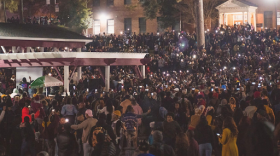A new study released by the United Negro College Fund calculates the economic impact of historically black colleges and universities across the country.
The report, "HBCUs Make America Strong: the Positive Economic Impact of Historically Black Colleges and Universities," says the total economic impact of HBCU spending in the United States is $14.8 billion dollars annually, the equivalent of a top 200 corporation.
Henry McKoy directs the entrepreneurship program at North Carolina Central University, an HBCU founded in 1910. He says these numbers are not surprising.
“Historically black colleges are businesses and they are institutions that serve a critical purpose for society," said McKoy. "I would argue that if those institutions were to be removed from society you would see a tremendous negative impact. I think this study from UNCF crystallizes that.”
NCCU employs approximately 2,000 people and has an annual economic impact of close to a $500 million, according to McKoy.
The study focuses on the contributions of 100 HBCUs. The study was underwritten by Citi Foundation and prepared by the University of Georgia, which is not a historically black institution.
“You have people sometimes arguing that these institutions should be sometimes shut down, sometimes merged with others with the idea that somehow they do not have value of their own, in their own independence," said McKoy. "I think this report is set up to show that they have a tremendous value to the communities.”
In a statement, Citi Foundation President Brandee McHale said: "The future economic competitiveness of our nation hinges on the positive economic outcomes of our young people. HBCUs are developing out next generation of business and civic leaders."
Historically black colleges and universities make up only three percent of America’s public and private non-profit colleges. They award 17 percent of African-American bachelor’s degrees.
Correction: An earlier version of this story incorrectly stated the year NCCU was founded. The story has been updated.










